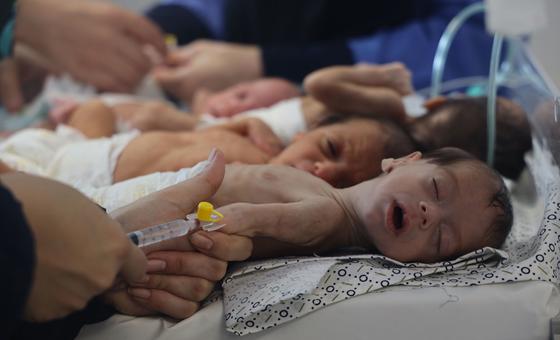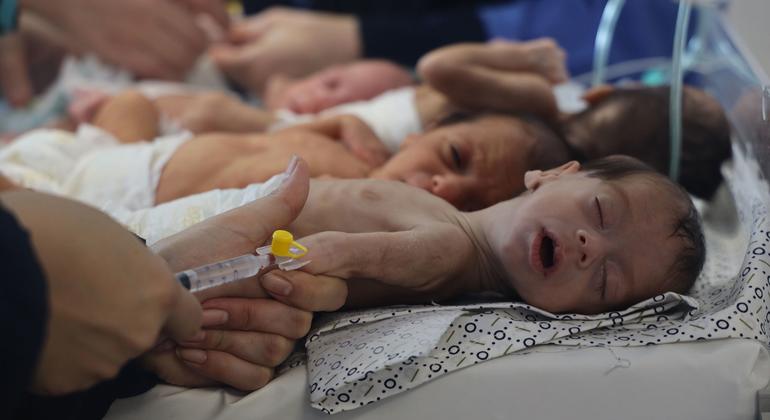
WHO’s Dr. Mike Ryan was briefing journalists at UN Headquarters and added that “so many children” remain in danger, as fighting between Palestinian militants and Israeli forces continues, from hostages to those living under bombardment with no safe place to shelter.
Up to 1,500 children in Gaza remain missing – many likely under rubble – he said, as the health system faces “extreme pressure”.
He said following the evacuation of many patients at the largest hospital, Al Shifa over the weekend, health staff remaining at Indonesian Hospital in northern Gaza may also need to be evacuated in the next few days amid continued fighting there.
The ultimatum from Israeli forces to keep moving is creating a concentration of people in UNRWA centres and schools, that “fuels epidemic risks” he added, and combined with cold rain recently, will lead to a spike in child pneumonia, Dr. Ryan warned.
Before long the public health risks will be as grave as those faced with injuries that are going untreated with water, food and fuel so scarce.
All of this adds up to a ‘recipe for epidemics’ while calorific intake is now below the “critical level” needed for the immune system to stay healthy, Dr. Ryan added.
Some Al Shifa patients remain ‘in life-threatening condition’
Rob Holden a WHO Senior Emergency Officer, briefing from Rafah in southern Gaza, gave further details on the dramatic evacuation of 31 premature babies to relative safety from the war-torn Al Shifa hospital in Gaza City.
He said the two-pronged weekend operation had been a success with babies and remaining family members evacuated from the area, working with the Palestinian Red Crescent.
He revealed that 28 of them had been sent across the border into the care of the Egyptian Red Crescent and on for treatment Monday, relaying the news that three of the babies had been reunited with their immediate families in southern Gaza.
For 220 patients who remain at Al Shifa, he said a number were “in a life threatening condition”, needed dialysis, and with one man remaining in intensive care.
He added that 25 patients had severe spinal injuries and WHO would work with the Palestinian Red Crescent to move them south.
Daily fuel supply agreed with Israel: Dujarric
The Israeli authorities have agreed to allow approximately 70,000 litres of fuel from Egypt into Gaza per day, the UN Spokesperson Stéphane Dujarric told correspondents in New York on Wednesday “which is well below the minimum requirements for essential humanitarian operations.”
He said the fuel would be distributed by the UN Relief and Works Agency, UNRWA, to support food distribution and the operation of generators at hospitals, water and sanitation facilities, shelters, and other critical services.
On Sunday, UNRWA and UN Children’s Fund UNICEF distributed around 19,500 litres of fuel to water and sanitation facilities south of the central zone of Gaza “enabling them to operate generators and resume their operation”, but only for around 24 hours, he added.
“To the north of Wadi Gaza, all water and sanitation facilities are presumed to be shut down, and no distribution of bottled water has been taking place since the start of the Israeli ground operations on 28 October, raising grave concerns about dehydration and waterborne diseases.”
He also said that the number killed in the attack that directly hit Al Fakhouri school in Jabalia on Saturday was at least 24 people, with others injured, citing UNRWA.
At the time of the incident, the facility was sheltering about 7,000 internally displaced.
And in an update on the UN’s diplomatic efforts, a note released to journalists in New York said political affairs chief, Rosemary DiCarlo, had met on Sunday with Israeli President Isaac Herzog and other senior Israeli officials.
She also met with families of hostages being held in Gaza.
On Monday, she held further meetings with Israeli officials and UN colleagues on the ground. On Tuesday, she is traveling to Ramallah in the West Bank to meet with Palestinian leaders there.



